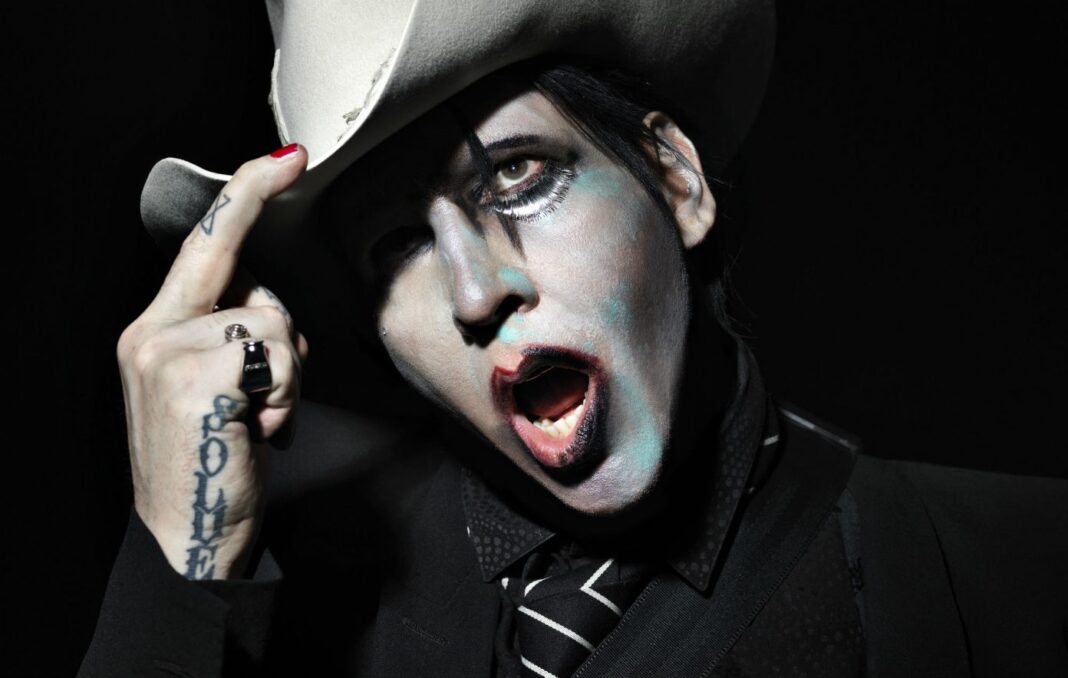Trigger warning: domestic & sexual abuse, violence, self-harm
Raised to mainstream prominence in 2017, the #MeToo movement is one that has brought all manner of uncomfortable truths to light, not least for the entertainment industry. For many, that journey to visibility isn’t just about finding peace, but about inspiring change. After years of speculation, actor Evan Rachel Wood this week named Marilyn Manson as the man behind allegations of grooming, rape, and ritualised torment that she had described on two separate occasions in court as illustrative evidence for the vital need for sexual assault survivors’ rights reform.
In this case, perhaps more than others, the balance between ‘shock’ and ‘depressingly familiar’ is a tough one to wrangle with. None of these allegations ever get any easier to hear, but there are certainly artists for whom accusations of this kind are an implicating full stop at the end of a long line of whispers and suspicions. Though Wood hadn’t named Manson until now, her court testimony was told with such detail that onlookers were easily able to deduce the alleged perpetrator from its timeline, sharing significant commonalities with the five other women who have come forward with their own allegations of violence, coercion and manipulation this week.
These fresh allegations join a 2018 report from actor Charlyne Yi in which she alleged that Manson harassed women and made racist comments on the set of TV Drama, House, as well as a declination in the same year by the Los Angeles County District Attorney’s Office to pursue reports of unspecified sex crimes dating back to 2011, due to an absence of corroboration. Though Manson this week described his art and life as “magnets for controversy”, he denies this week (as he did in 2018) that his relationships have ever been anything but fully consensual.
Something of a 90s anti-class hero, Marilyn Manson’s artistry is such that “controversy” might be putting it lightly. He was the shock-rocker kids loved to piss their parents off with, the one who offered thrilling experimentation and insight into devilish imagery and counter-cultural BDSM sexuality. Scapegoated as the musical influence for the Columbine Massacre, the resulting moral panic towards his music in the early 00s caused outcry in the alt scene but only served to mythicise his pageantry as something of a Scooby-Doo villain, an emblem of cartoonish edgelord nightmare. When he began dating the 19-year-old Wood in 2007, he featured her in the provocative music video for ‘Heart-Shaped Glasses’; by 2009, he was beating a female character who looked suspiciously like her in ‘Running to the Edge of the World’.
As we’ve discussed in previous columns, it’s not always helpful to conflate artistic license with confession, or macabre interests with evil. But in Manson’s presentation of pantomime villainy, it is possible that we, as an audience, have allowed ourselves to overlook the more troubling aspects of his ‘artistic’ disdain for women for far too long. In his 1998 best-selling memoir, he describes numerous sexual encounters of sketchy manipulation, often involving fans – tricking girls into drinking tequila-disguised-as-beer until they passed out, making anonymous telephone rape threats as a method of ‘flirting’, urinating in a deaf fan’s ear – all underwritten with a strong undercurrent of wilful, belittling misogyny. While some of this might be explained away as kink or dark fantasy exaggeration, in since-deleted blog posts, he has also threatened the ‘soon-to-be-murdered-press’ who critique his work, and told a Spin journalist in 2009 that he fantasised about smashing Wood’s head with a sledgehammer, once calling her 158 times in a day, self-harming with each call to ‘show her the pain she’d put him through’. Asked to comment on this by LouderSound last year, his publicist shrugged it off as part of the typical ‘shock factor’ Marilyn Manson press routine: “obviously a theatrical rock star interview promoting a new record, and not a factual account. The fact that Evan and Manson got engaged six months after this interview would indicate that no one took this story literally.”
Though both the words of Manson and his publicist ring serious alarm bells in today’s light, it is true that Manson’s intentional headline-bating is something we perceive as rare when it comes to abusers. For one reason or another, we expect dangerous people to be shameful about their actions, staying under the radar so as not to get caught. Someone like Manson, who literally describes himself as ‘The Anti-Christ’, has almost set his own bar too low to face proper accountability – too ‘weird’ to be expected to conform to moral standards, too bait-and-switching for fans to separate the ‘theatrical’ from the truly implicating. Aside from the obvious pitfalls of tarring all BDSM enthusiasts with the same ‘sick deviant’ brush, the result of his involvement in such allegations is that a great number of the reactions this week have fallen into the category of victim-blaming (“what did she expect dating someone like that”), indifference (“this is old news”), or ill-timed diminishing humour (“his music is the real crime”). Along with a sadly-growing fatigue from #MeToo-related allegations in general (“cancel culture is at it again”), we end up with a situation where very troubling allegations are shrugged off as par for the course, or where fan infighting about the right way to continue listening overshadows the much more important conversation as to how we stop these kind of abuses from happening in the first place.
While suspicious voices ponder why Wood didn’t leave or speak up sooner, she was using her experience to successfully campaign for the creation of the Phoenix Act, which extends the statute of limitations on domestic violence from three years to five. Criticisms of her delay in naming Manson do nothing to acknowledge the difficulties of being taken seriously in the necessary legal timespan, or of the relative risks that come from highlighting such an influential figure. Even without the celebrity aspect, it can take domestic and sexual abuse victims years to psychologically reconcile a life without their abuser, or to put themselves through the pain of reliving their experiences in court. With the latest woman to come forward, musician Chloe Black, BDSM can no longer be used as a veil for blurred lines – she was clear that she had never consented to any type of violence as part of the relationship, and alleges in great detail the ways in which Manson sought to undermine and alienate her with deeply disturbing threats.
According to Women’s Aid, domestic and sexual abuse takes on many forms – name-calling and belittling, sulking and punishing, isolating and lying, harassing and stalking, denial and gaslighting, right through to threats or acts of physical and sexual violence. The women who have come forward with allegations against Manson describe a great many of these, as do many of the motifs he’s used in interviews and songs himself over the years, constructing his own model villain. His record label, Loma Vista Recordings, who dropped him this week, will have been well aware of them for quite some time, as will anyone within his fanbase who maybe worked a little harder than usual to separate the art from the artist.
It’s an eternal truth of fandom that we can never truly know the depths of the people we admire, or even really comprehend how the events of their personal lives exist in the objective truth. For those who haven’t known abuse, it is also difficult to ever truly understand the courage it might take to speak your truth into the void and hope that somebody takes you seriously. Whether Manson continues to claim artistic license or otherwise is a matter likely set for the courts, but there are no real winners in these cases – not fans, not the accused, and certainly not the accuser.
Though social media and internal anguish make us feel otherwise, the way forward from here is not to point fingers at fans who are taking the news harder than others, or to smugly proclaim how you never liked Marilyn Manson’s music anyway. The way forward instead is to call for accountability as we see it, to disrupt the cycle of normalisation that keeps victims silent and afraid, and to remember that abuse takes on a great many forms, identities and subcultures. In Manson’s case, the allegations stacked up against him are more than worthy of investigation, but the same could have been said of 20 years ago. This is not a reason to turn a blind eye now – it’s a reason to question what our eyes might have slid over in the first place.
If you or somebody you know has been affected by sexual assault or abuse of any kind, we encourage you to reach out for support. These charities can offer valuable support and advice.
The Survivors Trust Helpline: 08088 010818 https://www.thesurvivorstrust.org/
Rape Crisis England & Wales https://rapecrisis.org.uk/
Women’s Aid https://www.womensaid.org.uk/



